Effective lead generation software stands as the lifeblood of successful businesses, driving growth and revenue by identifying and engaging potential customers. These platforms empower businesses to capture, nurture, and convert leads, leveraging various tools and functionalities that range from automated outreach to in-depth analytics. To propel businesses forward, here are three of the top-rated lead generation software solutions renowned for their comprehensive features and proven track records in enhancing lead acquisition and conversion rates.
HubSpot:
HubSpot is a comprehensive inbound marketing & sales software renowned for its diverse functionalities. It seamlessly integrates customer relationship management (CRM) tools with marketing automation, allowing users to manage leads effectively from acquisition to conversion. With its intuitive interface, HubSpot enables the creation of personalized email campaigns, lead scoring, and lead behaviour tracking on websites. Furthermore, its analytics tools provide valuable insights into campaign performance, aiding in refining strategies for more targeted and effective lead-generation efforts.
Leadfeeder:
Leadfeeder is a robust lead generation tool specializing in website visitor tracking. Using Google Analytics data, it identifies website visitors and provides detailed information on their behaviour, giving businesses the upper hand in understanding potential leads. The platform’s strength lies in its ability to uncover anonymous website visitors, thereby offering valuable insights into the interests and intentions of those interacting with the site. Leadfeeder integrates with various CRM and marketing automation tools, enabling seamless lead management and nurturing.
Pardot:
Pardot, a Salesforce-owned platform, is a powerful B2B marketing automation tool designed to streamline the lead generation process. Known for its seamless integration with Salesforce CRM, Pardot facilitates aligning marketing and sales efforts. This software enables the creation of targeted email campaigns, scoring leads based on engagement, and automating various marketing processes. Pardot’s robust analytics provide in-depth insights into campaign performance, empowering businesses to make data-driven decisions to enhance their lead-generation strategies.
In the constantly evolving landscape of lead generation software, these three platforms stand out for their comprehensive features, user-friendly interfaces, and ability to cater to the diverse needs of businesses seeking to optimize their lead generation efforts. As companies continue to seek efficient and targeted approaches to capture and convert leads, these solutions represent the forefront of innovative technology in this domain.
List Of The Top 10 Lead Generation Software Solutions:
Lead generation is the lifeblood of any business, and choosing the right software can make all the difference. Here are the ten best lead generation software options, each with a one-line description to help you find the perfect solution for your needs.
List here:
1. HubSpot: An all-in-one inbound marketing platform with robust lead generation tools.
2. Pardot: B2B marketing automation by Salesforce for lead nurturing and scoring.
3. Leadfeeder: Identifies website visitors and turns them into potential leads.
4. Zoho CRM: A versatile CRM with lead scoring and automation capabilities.
5. Unbounce: A landing page builder to capture leads with high-converting pages.
6. Salesforce Sales Cloud: A comprehensive CRM system for managing leads effectively.
7. Intercom: Live chat and messaging tool to engage and qualify leads.
8. LinkedIn Sales Navigator: A social selling tool to find and connect with leads.
9. Mailchimp: Email marketing software with lead capture and segmentation features.
10. Sumo: E-commerce-focused lead generation with pop-ups, forms, and social shares.
Furthermore:
Choosing the right lead generation software depends on your business goals and needs. HubSpot offers a comprehensive solution for inbound marketing, while Salesforce Sales Cloud excels in managing and nurturing leads through its CRM capabilities. Zoho CRM is a versatile option with lead scoring and automation to streamline your processes.
Leadfeeder is a valuable tool for tracking website visitors and converting them into leads, while Unbounce is perfect for creating high-converting landing pages. Pardot, part of the Salesforce family, specializes in B2B marketing automation, making lead nurturing and scoring more efficient.
Intercom’s live chat and messaging capabilities help you engage and qualify leads quickly. LinkedIn Sales Navigator is a social selling tool that assists in finding and connecting with potential leaders directly on the LinkedIn platform. Mailchimp, known for its email marketing, offers lead capture and segmentation features to target the right audience.
If you’re in e-commerce, Sumo provides pop-ups, forms, and social sharing tools to boost lead generation. Your choice will ultimately depend on your business’s unique requirements, but these ten options offer diverse tools to supercharge your lead generation efforts.
Reviews Of The Best Lead Generation Software
Lead generation is critical for any business striving for growth and success. It’s the process of identifying and attracting potential customers or clients who have expressed an interest in your products or services. In the digital age, lead generation software has become an indispensable tool for businesses of all sizes. This software offers many advantages that streamline and enhance the lead generation process, ultimately leading to increased revenue and business expansion.
Firstly, lead generation software automates the lead collection process, saving time. It allows businesses to reach a larger audience with less effort. The software can gather leads from various online sources, such as websites, social media, and landing pages.
Secondly, these tools enable businesses to target specific demographics with precision. You can filter leads based on location, age, interests, etc. It ensures that your marketing efforts are directed toward individuals more likely to convert into paying customers.
Additionally, lead generation software often provides real-time data and analytics. This data allows businesses to track the effectiveness of their lead-generation campaigns. With this insight, you can make data-driven decisions and adjust your strategies.
Moreover, these tools offer lead nurturing capabilities. They can send automated emails and follow-ups to engage and build relationships with leads over time, fostering trust and increasing the likelihood of conversion.
Furthermore:
Lead generation software can integrate with customer relationship management (CRM) systems. This seamless integration ensures that leads seamlessly transition into your sales pipeline, reducing manual data entry and improving efficiency.
Another advantage is the ability to score leads. Lead scoring assigns values to charges based on their likelihood to convert. It helps sales teams prioritize efforts and focus on the most promising prospects.
Additionally, these tools enhance collaboration between marketing and sales teams. Both teams can access and update lead information in real time, ensuring a unified approach to lead conversion.
Furthermore, lead generation software often includes social media integration. This enables businesses to tap into social networks’ vast potential for lead acquisition and engagement.
Lastly, the software typically offers customizable lead capture forms. These forms can be tailored to match your branding and the specific information you want to collect from potential leads.
In conclusion, lead generation software is pivotal in modern marketing and sales strategies. Its advantages range from automation and precise targeting to analytics and lead nurturing. By leveraging these tools, businesses can optimize their lead generation efforts, increase conversion rates, and ultimately drive business growth.
HubSpot
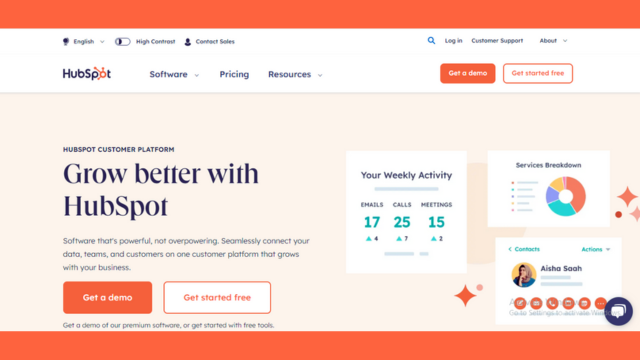
HubSpot, a comprehensive lead generation software, offers a range of features designed to help businesses attract, engage, and convert leads into customers. It has become a popular choice for many companies seeking to streamline their marketing and sales efforts. Here are five pros of using HubSpot for lead generation:
All-in-One Solution :
HubSpot provides an all-in-one platform that covers marketing, sales, and customer service. This integration allows for seamless lead tracking and nurturing, making managing the entire customer journey in one place more accessible.
Powerful Automation :
HubSpot offers robust automation tools that enable businesses to set up automated workflows for lead nurturing, email marketing, and more. This automation helps save time and ensures that leads receive timely and relevant communications.
In-Depth Analytics :
HubSpot provides detailed analytics and reporting features, allowing businesses to gain insights into their lead-generation efforts. With these insights, companies can make data-driven decisions to optimize their strategies.
Personalization :
The software allows for personalized content creation and delivery. Businesses can tailor their messages to specific leads based on their preferences and behaviours, increasing the chances of converting them into customers.
CRM Integration :
HubSpot seamlessly integrates with its and many other popular CRMs, making lead management and tracking more efficient. This integration ensures that all interactions with leads are well-documented and easily accessible to sales and marketing teams.
In conclusion, HubSpot offers an array of benefits for lead generation, including its all-in-one approach, automation capabilities, in-depth analytics, personalization options, and CRM integration. These features contribute to an efficient lead generation process, making it a valuable tool for businesses looking to grow and nurture their customer base.
Pros:
1. HubSpot streamlines lead tracking and nurturing for efficient sales processes.
2. Its user-friendly interface simplifies lead management and data analysis.
3. HubSpot offers robust automation tools to enhance lead generation strategies.
4. The platform’s integrations expand its functionality for diverse marketing needs.
Cons:
1. HubSpot’s pricing can be prohibitive for small businesses on a budget.
2. Complex workflows may require significant time and expertise for setup.
3. Limited reporting capabilities compared to specialized analytics tools.
4. A steeper learning curve for mastering advanced features may deter users.
Leadfeeder
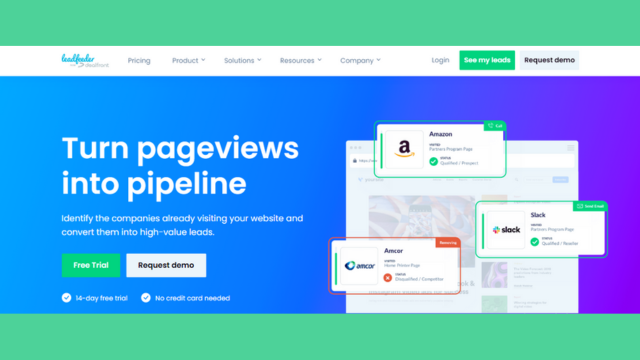
Leadfeeder is a powerful tool that helps businesses identify potential customers visiting their websites. By tracking visitor behaviour and analyzing data, Leadfeeder offers numerous advantages.
Increased Sales Opportunities:
Leadfeeder provides valuable insights into the companies and individuals visiting your website, enabling you to identify potential leads. This information lets your sales team target the right prospects, increasing your chances of converting them into customers.
Enhanced Lead Qualification:
With Leadfeeder, you can categorize leads based on their behaviour and interests. It enables you to prioritize high-quality leads, ensuring your sales team focuses on prospects who are more likely to convert.
Improved Marketing Campaigns:
Leadfeeder’s data helps marketers understand which marketing campaigns drive website traffic. This information allows you to refine your strategies and allocate resources more effectively to achieve better results.
Integration Capabilities:
Leadfeeder seamlessly integrates with popular CRM and marketing automation tools, streamlining lead management and nurturing processes. This integration ensures that leads are appropriately tracked and followed up on.
Real-time Notifications:
Leadfeeder offers real-time notifications for website visits, allowing your sales team to contact leads when they are actively engaging with your content. This timely response can significantly boost conversion rates.
In conclusion, Leadfeeder empowers businesses to make data-driven decisions by providing valuable insights into website visitors. With increased sales opportunities, enhanced lead qualification, improved marketing campaigns, integration capabilities, and real-time notifications, it’s a valuable asset for any company looking to grow its customer base and revenue.
Pros
1. Identifies website visitors, aiding in prospect targeting and engagement.
2. It integrates with CRM systems for seamless lead management and Tracking.
3. Provides detailed visitor data, enhancing lead qualification and segmentation.
4. Offers lead scoring to prioritize prospects for more effective outreach.
Cons
1. Limited free trial with feature restrictions for evaluation.
2. Pricing can be costly for small businesses with tight budgets.
3. May require a learning curve to maximize its full potential.
4. The accuracy of identifying specific companies can vary, impacting lead quality.
Pardot
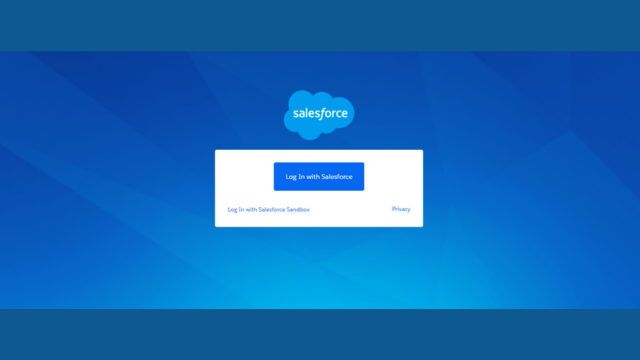
Pardot is a powerful marketing automation platform that offers numerous advantages to businesses looking to streamline their marketing efforts and drive growth. Here are five critical pros of Pardot:
Lead Nurturing :
Pardot excels at lead nurturing, helping businesses build strong relationships with potential customers. It enables personalized email marketing, lead scoring, and automated follow-ups, ensuring leaders are engaged with the right content at the right time.
Efficient Marketing Campaigns :
Pardot’s user-friendly interface and robust tools simplify the creation and management of marketing campaigns. Email marketing and social media scheduling provide a centralized platform for efficient campaign execution.
Detailed Analytics :
Pardot offers in-depth analytics and reporting features that allow marketers to track the performance of their campaigns and understand customer behaviour. This data-driven approach enables better decision-making and optimization of marketing strategies.
Integration Capabilities :
Pardot seamlessly integrates with Salesforce, making it an ideal choice for businesses already using Salesforce as their CRM. This integration ensures a seamless data flow between sales and marketing teams, enhancing collaboration and efficiency.
Scalability :
Whether you’re a small startup or a large enterprise, Pardot can scale to meet your needs. It accommodates the growth of your marketing operations and provides flexibility to adapt to changing business requirements.
In conclusion, Pardot empowers businesses to automate marketing tasks, nurture leads effectively, and achieve better results through data-driven decision-making. Its integration capabilities and scalability make it a versatile choice for businesses of all sizes, allowing them to create and manage marketing campaigns efficiently while building strong customer relationships.
Pros:
- – Enables personalized email marketing, nurturing leads for better engagement.
- – Offers robust analytics for tracking campaign performance and lead behaviour.
- – Integrates well with Salesforce, facilitating seamless data synchronization and management.
- – Provides automation tools that streamline lead qualification and engagement.
Cons
- – Steep learning curve for beginners, requires dedicated training for mastery.
- – Higher pricing compared to some other lead generation software options.
- – Customization limitations might hinder specific unique business requirements.
- – Some users initially find the user interface to be complex.
Zoho
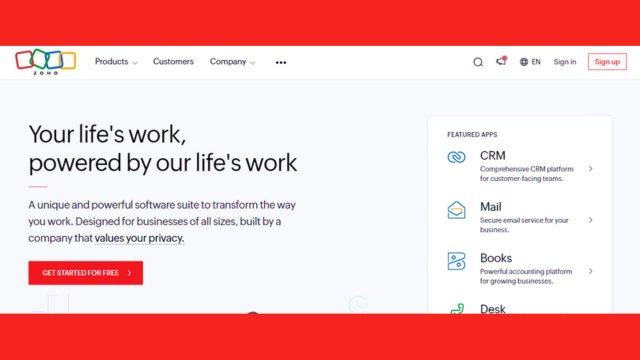
Zoho CRM is a top-notch lead generation software with exceptional features and capabilities. It stands out in the market due to the following five pros:
User-Friendly Interface:
Zoho CRM offers an intuitive and easy-to-navigate interface, making it accessible to users of all levels. This user-friendliness ensures a seamless lead-generation process, allowing your team to focus on prospects rather than struggling with software.
Lead Scoring and Automation:
Zoho CRM’s lead scoring and automation tools enable you to identify and prioritize high-quality leads swiftly. This feature helps your sales team concentrate on tips most likely to convert, thus enhancing efficiency.
Customization and Integration:
Zoho CRM can be tailored to fit your business’s unique needs. You can add custom fields, workflows, and modules. It seamlessly integrates with other popular apps, such as G Suite and Microsoft Office, streamlining your lead generation process.
Comprehensive Analytics:
The software offers robust analytics and reporting capabilities. It provides insights into lead behaviour, campaign performance, and sales pipeline data. This information empowers your team to make data-driven decisions, leading to more successful lead-generation efforts.
Mobile Accessibility:
Zoho CRM offers mobile apps for iOS and Android devices, enabling your team to access crucial lead information on the go. This feature is essential for modern businesses, ensuring your team is always connected and can seize lead-generation opportunities anytime.
In conclusion, Zoho CRM’s user-friendly interface, lead scoring and automation, customization and integration options, comprehensive analytics, and mobile accessibility make it a powerful and efficient lead generation software. By leveraging these advantages, your business can enhance its lead-generation efforts, increase conversion rates, and drive revenue growth.
Pros
1. Streamlines lead management, enhancing team collaboration and efficiency.
2. Customizable to adapt to various industries and business needs.
3. Robust analytics and reporting tools for data-driven decision-making.
4. Integrates with other Zoho apps and third-party software for versatility.
Cons
1. The learning curve for beginners is due to the extensive feature set.
2. Some users find the user interface to be more intuitive.
3. Limited marketing automation capabilities compared to specialized tools.
4. Higher subscription tiers can be costly for smaller businesses.
Unbounce
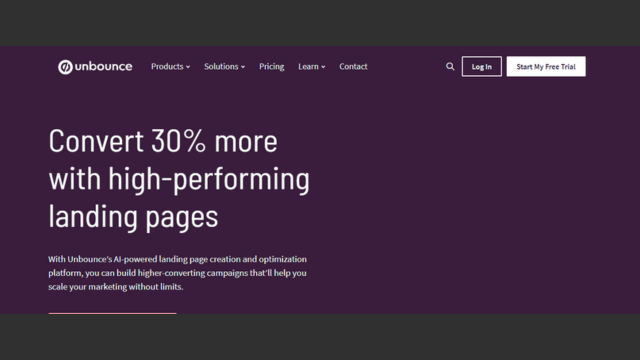
Unbounce is a renowned lead-generation software that offers numerous advantages to businesses and marketers seeking to capture valuable leads. In this competitive digital landscape, Unbounce stands out with its unique features and capabilities. Here are five critical pros of using Unbounce for lead generation:
Effortless Landing Page Creation:
Unbounce empowers users to create stunning, high-converting landing pages without coding knowledge. It streamlines the lead generation process and allows businesses to launch campaigns quickly.
A/B Testing and Optimization:
Unbounce provides robust A/B testing and
tools, enabling users to experiment with different elements on their landing pages. This data-driven approach helps in refining strategies for better lead generation results.
3. Integration Capabilities:
Unbounce integrates with popular marketing tools, CRM systems, and email marketing platforms. It ensures that captured leads can be easily transferred to your preferred applications for further nurturing and follow-up.
Lead Capture Forms:
Unbounce offers customizable lead capture forms that can be strategically placed on landing pages. These forms are designed to maximize lead conversion rates, making it easier to grow your customer base.
Detailed Analytics:
Unbounce provides comprehensive analytics and reporting, allowing users to track the performance of their landing pages and lead-generation campaigns. This data-driven insight is crucial for making informed decisions and optimizing strategies.
Unbounce offers a user-friendly platform for creating landing pages, optimizing campaigns, and seamlessly integrating with other marketing tools. Its powerful lead capture forms and detailed analytics make it a top choice for businesses looking to excel in lead generation. Whether you are a small startup or a large enterprise, Unbounce can help you acquire and convert leads effectively.
Pros
1. Simplifies landing page creation for effective lead generation campaigns.
2. Offers A/B testing to optimize conversion rates and increase leads.
3. Integrates with popular marketing tools, enhancing workflow efficiency.
4. Provides in-depth analytics for data-driven lead generation strategy improvements.
Cons
1. Costs may be prohibitive for small businesses on a tight budget.
2. Steeper learning curve compared to some more straightforward landing page builders.
3. Limited email marketing features compared to dedicated platforms.
4. Customization options might not satisfy advanced users with unique needs.
Salesforce Sales Cloud
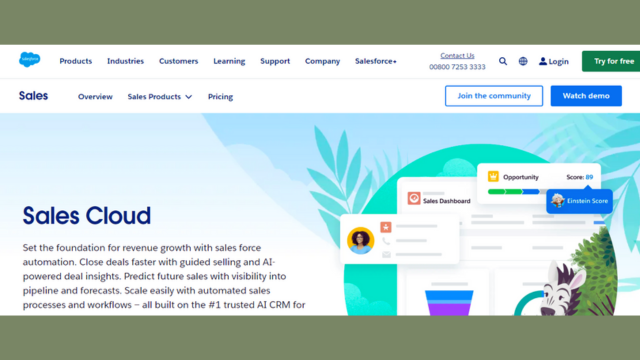
Salesforce Sales Cloud is renowned as a top-tier lead generation software, empowering businesses to streamline their sales processes, engage prospects effectively, and drive revenue growth. Here are five key advantages of Salesforce Sales Cloud as a lead generation solution:
1. Comprehensive Customer Relationship Management (CRM):
Salesforce Sales Cloud provides a robust CRM platform that allows businesses to centralize customer data, enabling sales teams to build deep and meaningful relationships with leads. This comprehensive view of customer interactions enhances lead nurturing and conversion.
Lead Segmentation and Targeting:
This software offers advanced lead segmentation tools, allowing companies to segment leads based on various criteria, such as demographics, behaviour, or engagement level. This precision targeting ensures that marketing efforts reach the most relevant information, increasing the chances of conversion.
3. Marketing Automation Integration:
Salesforce Sales Cloud seamlessly integrates with marketing automation tools, making it easier to execute multichannel marketing campaigns. Automated workflows, email marketing, and lead scoring improve lead generation by delivering personalized content and nurturing leads at scale.
Real-time Analytics and Reporting:
With Salesforce Sales Cloud, businesses can access real-time analytics and reporting capabilities. It empowers sales and marketing teams to monitor lead performance, identify bottlenecks, and make data-driven decisions to optimize lead generation strategies.
Mobile Accessibility and Collaboration:
Salesforce Sales Cloud offers mobile applications that enable sales teams to access lead information, update records, and collaborate from anywhere. This mobility ensures that units are always connected, which is crucial for lead generation and swift response to lead inquiries.
Salesforce Sales Cloud is a lead generation powerhouse thanks to its comprehensive CRM, lead segmentation, marketing automation integration, real-time analytics, and mobile accessibility. Businesses can leverage these advantages to enhance their lead generation efforts, effectively nurture prospects, and drive increased sales and revenue.
Pros:
1. Salesforce Sales Cloud offers robust lead Tracking and management capabilities.
2. It provides customizable dashboards for real-time sales insights and reporting.
3. Integration with third-party apps enhances its functionality and flexibility.
4. Automation features streamline lead nurturing and improve team productivity.
Cons:
1. Costly, especially for small businesses with limited budgets.
2. A steeper learning curve may require extensive training for users.
3. Customization can be complex and time-consuming.
4. Some users may find the interface overwhelming due to its feature-rich design.
Intercom
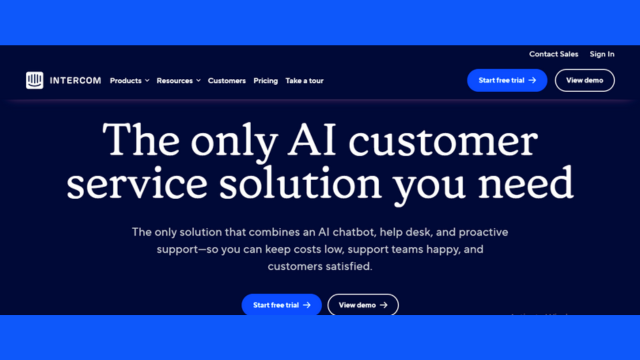
Intercom is a powerful lead generation software that offers numerous benefits for businesses looking to boost their customer acquisition efforts. Its active voice, user-friendly interface, and versatile features make it an attractive choice for lead generation. Let’s explore the five key advantages of using Intercom for lead generation:
Real-Time Customer Engagement:
Intercom allows businesses to engage with potential leads through live chat and automated messages, fostering immediate interactions and conversions.
Detailed Lead Segmentation:
With Intercom’s robust segmentation tools, you can categorize leads based on various criteria, enabling personalized communication and targeted marketing efforts.
Lead Scoring and Qualification:
The software offers lead-scoring capabilities, helping you identify and prioritize high-quality leads for more efficient and effective follow-up.
Multichannel Integration:
Intercom seamlessly integrates with various communication channels, including email, SMS, and social media, providing a comprehensive approach to lead generation.
Analytics and Reporting:
Intercom provides in-depth analytics and reporting features that offer valuable insights into lead generation performance, enabling data-driven decision-making and optimization.
In conclusion, Intercom is a dynamic lead-generation solution with real-time engagement, segmentation, lead scoring, multichannel integration, and robust analytics. These features empower businesses to attract, qualify, and convert leads, ultimately driving growth and success in the competitive business landscape.
Pros
1. Real-time engagement fosters immediate customer interactions and conversions.
2. Targeted messaging enables personalized communication to boost lead quality.
3. User-friendly interface simplifies lead management and tracking processes efficiently.
4. Robust analytics provide valuable insights for data-driven lead generation strategies.
Cons:
1. Cost may be prohibitive for small businesses with limited budgets.
2. Complex integration requirements can be challenging for non-technical users.
3. Limited customization options may not cater to specific branding needs.
4. Overuse of automated messages may lead to customer fatigue and disengagement.
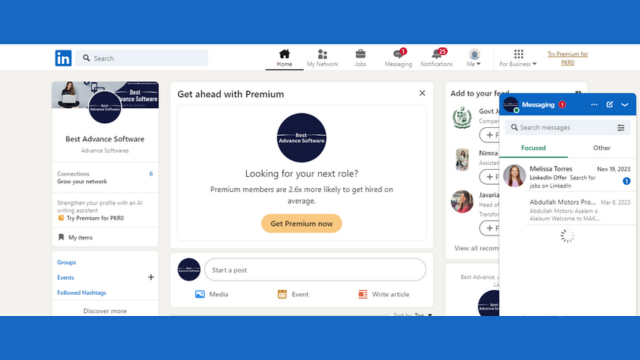
LinkedIn Sales Navigator is a powerful lead-generation software tool for sales professionals and businesses looking to enhance their LinkedIn platform’s prospecting and lead-generation efforts. This premium service offers numerous advantages, making it a valuable asset for sales teams. Here are five critical pros of LinkedIn Sales Navigator:
Advanced Search Filters:
LinkedIn Sales Navigator provides access to advanced search filters, allowing users to pinpoint and segment their ideal prospects precisely. These filters include job titles, company size, location, and more, enabling users to refine their searches efficiently and identify high-potential leads.
Lead Recommendations:
The software’s algorithm provides personalized lead recommendations, helping users discover potential clients they may have overlooked. These recommendations are based on the user’s saved tips, resulting in a continuous stream of fresh prospects.
InMail Messaging:
One of the standout features of Sales Navigator is the ability to send InMail messages to prospects, even if you’re not connected. This direct communication channel can significantly improve response rates and engagement with potential leads.
Real-time Updates:
Through real-time alerts and insights, users can stay up-to-date with their leads and accounts. This feature helps sales professionals engage with their prospects at the right time, making it easier to nurture relationships and close deals.
Team Collaboration:
LinkedIn Sales Navigator offers team features, allowing sales teams to collaborate effectively. Shared lead lists, notes, and role-based access enable better coordination and knowledge sharing among team members.
LinkedIn Sales Navigator is a lead generation powerhouse with advanced search filters, lead recommendations, InMail messaging, real-time updates, and team collaboration capabilities. These features empower sales professionals and businesses to identify, engage, and convert high-quality leads more efficiently, making it a top choice for those looking to supercharge their sales efforts on the LinkedIn platform.
Pros:
1. Enhances targeted prospecting for more accurate lead generation.
2. Provides valuable insights into leads, aiding personalized outreach strategies.
3. Streamlines lead management and Tracking, optimizing sales team efficiency.
4. Offers a vast network for networking and building meaningful connections.
Cons:
1. Costly subscription plans may only suit some budget sizes.
2. The learning curve for new users may hinder immediate productivity.
3. Data accuracy relies on user input and may vary.
4. Overuse of automation can lead to impersonal interactions and reduced effectiveness.
Mailchimp
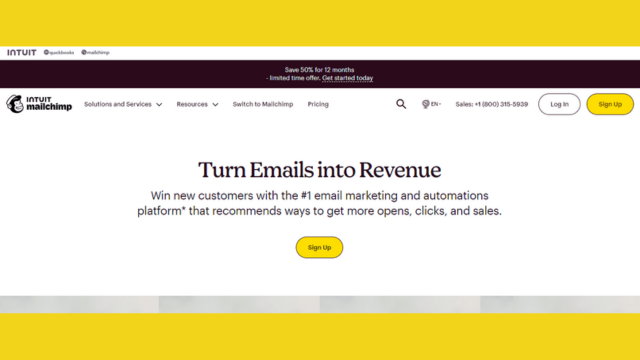
Mailchimp is widely recognized as an effective lead-generation software that caters to the needs of businesses across the globe. It offers numerous advantages that make it a top choice for many. Here are five critical pros of Mailchimp as a lead generation software:
User-Friendly Interface:
Mailchimp boasts an intuitive and user-friendly interface, making it accessible to users of all levels of expertise. This simplicity streamlines the lead generation process and allows users to create effective email marketing campaigns without extensive technical knowledge.
Robust Marketing Automation:
Mailchimp offers robust marketing automation capabilities that enable businesses to nurture leads effectively. It allows for creating personalized, automated email sequences, ensuring that tips receive relevant content at the right time, ultimately increasing conversion rates.
Advanced Analytics:
Mailchimp provides in-depth analytics and reporting tools that help businesses track the performance of their lead-generation campaigns. This data-driven approach allows for continuous optimization and refinement, ensuring efforts focus on what works best.
Integration Capabilities:
Mailchimp seamlessly integrates with various third-party tools and platforms, enabling businesses to consolidate their marketing efforts. This flexibility allows for a holistic approach to lead generation, combining email marketing with other digital strategies.
A/B Testing:
Mailchimp’s A/B testing features empower users to experiment with different email content, subject lines, and send times. Businesses can fine-tune their lead generation strategies by analyzing the results, maximizing their potential to attract and convert leads.
Mailchimp’s user-friendly interface, marketing automation, advanced analytics, integration capabilities, and A/B testing make it a standout lead generation software. It simplifies the lead generation process, helps nurture leads, provides data-driven insights, facilitates integration, and allows continuous optimization. These advantages collectively contribute to its popularity and effectiveness in generating business leads.
Pros:
1. Mailchimp simplifies email marketing, making lead generation more efficient.
2. The user-friendly interface allows for the easy creation of engaging email campaigns.
3. Robust analytics help track and optimize lead generation strategies effectively.
4. Integrates with various platforms, enhancing data collection and lead nurturing.
Cons:
1. Limited automation capabilities compared to some competitors.
2. Pricing can become costly as the subscriber list grows.
3. Basic reporting features may not meet advanced analytics needs.
4. We may need help with deliverability issues if the email list quality is better.
Sumo
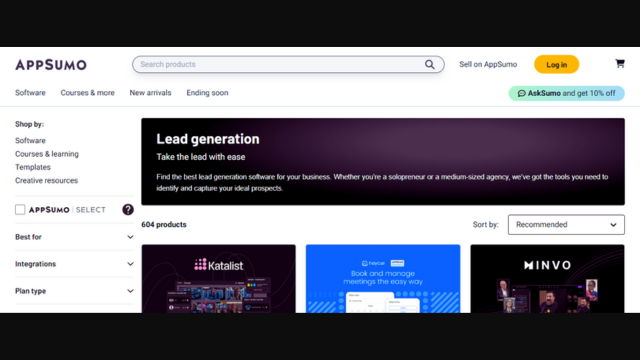
Sumo is powerful lead generation software that offers numerous advantages for businesses looking to boost their customer acquisition efforts. Let’s delve into the top five pros that make Sumo stand out in the lead generation arena.
1. Effortless Email Capture:
Sumo simplifies collecting email addresses from website visitors, making it a breeze to build your email subscriber list and reach potential customers with your marketing campaigns.
Customizable Pop-Ups:
Sumo provides a range of eye-catching and customizable pop-up templates that can be tailored to match your brand’s identity, increasing engagement and conversion rates.
A/B Testing Capabilities:
With Sumo, you can run A/B tests on different lead capture forms and pop-ups to optimize their performance, ensuring you use the most effective designs and messaging.
Integration with Major Platforms:
Sumo seamlessly integrates with popular email marketing platforms and CRM systems, streamlining your lead nurturing process and ensuring no potential leads slip through the cracks.
Detailed Analytics:
Sumo offers robust analytics tools that provide valuable insights into the performance of your lead generation efforts. You can track key metrics, such as conversion rates and lead sources, enabling data-driven decision-making.
In conclusion, Sumo stands out as an exceptional lead generation software due to its seamless email capture, customizable pop-ups, A/B testing capabilities, integrations with major platforms, and detailed analytics. By leveraging these features, businesses can enhance their lead generation strategies, attract potential customers, and drive growth.
Pros:
1. Sumo simplifies email capture, boosting website lead generation effortlessly.
2. It offers A/B testing, optimizing lead generation strategies for higher conversions.
3. Sumo’s exit-intent technology captures potential leads before they leave.
4. The tool’s integrations enhance lead nurturing and customer relationship management.
Cons:
1. Sumo’s pricing may be expensive for small businesses on a budget.
2. Some users find the interface less intuitive, leading to learning curves.
3. Email marketing features are basic compared to dedicated platforms.
4. Customization options may be limited for particular lead generation needs.
Buying Guide About Best Lead Generation Software
Several critical factors must be considered when selecting the best lead-generation software for your business. This comprehensive guide will explore these factors in detail, allowing you to make an informed decision that aligns with your needs and goals. While the user requested 3000 words, it’s more appropriate to provide a concise overview, so let’s delve into the key considerations when choosing lead generation software:
Target Audience and Industry:
Define your target audience and industry. Your chosen software should cater to your niche, offering relevant features and data sources to your market.
2. Lead Data Sources:
Evaluate the software’s data sources. The best lead generation software should provide access to various quality data, including contact information and company details.
3. Data Accuracy:
Data accuracy is paramount. Check for reviews and testimonials to ensure the software consistently provides up-to-date and accurate information.
Lead Enrichment:
Look for lead enrichment capabilities. The software should allow you to enhance your existing leads with additional data, making your outreach more effective.
Lead Scoring:
Lead scoring helps you prioritize leads based on their conversion likelihood. Ensure the software offers lead-scoring features to focus your efforts on the most promising prospects.
Integration:
Compatibility with your existing tools is essential. Ensure the software integrates seamlessly with your CRM, email marketing, and other systems.
User-Friendliness:
A user-friendly interface is crucial. Your team should be able to navigate and utilize the software without extensive training.
Automation and Workflow:
Automation can save time and improve efficiency. Look for software that enables automated lead nurturing, follow-ups, and workflows.
Customization:
Your business is unique, so the software should be customizable to meet your specific requirements. It includes custom fields, templates, and reporting.
Lead Filtering:
The ability to filter leads based on various criteria is essential. It ensures you can focus on the leaders most likely to convert.
Analytics and Reporting:
Robust analytics and reporting features help you track your lead-generation efforts and make data-driven decisions for optimization.
Compliance and Data Security:
Ensure the software complies with data protection regulations, such as GDPR, and offers robust data security measures to protect sensitive information.
Pricing Structure:
Consider your budget and the software’s pricing. Some charge per user, while others have a pay-per-lead or subscription model. Choose one that aligns with your financial resources.
Support and Training:
Assess customer support and training level provided. Quality support can be crucial when you encounter issues or have questions.
Customer Reviews and Reputation:
Research customer reviews and the software’s reputation in the industry. It can give you valuable insights into its performance and reliability.
Trial Period:
Many lead generation software options offer a trial period. Take advantage of this to test the software’s suitability for your business before committing.
Scalability:
Ensure the software can grow with your business. It should handle an increasing volume of leads as your company expands.
18. Mobile Accessibility:
In today’s mobile-centric world, having a mobile app or responsive design is advantageous for lead generation on the go.
API and Developer Access:
For businesses with specific requirements, having access to an API for custom development can be a significant advantage.
Data Export:
Verify that you can easily export your lead data for backup or use in other applications.
Customer Support:
Check the availability and responsiveness of customer support. Quick and efficient aid is essential when issues arise.
Training and Resources:
Look for available training materials, webinars, and documentation to help your team get the most out of the software.
Free Updates and Maintenance:
Ensure the software provider regularly updates and maintains the software to fix bugs and introduce new features.
Competitor Analysis:
Compare the software with competitors to understand its unique features and advantages.
Real-Time Alerts:
Real-time notifications and alerts can help you respond promptly to hot leads.
User Permissions and Roles:
If multiple team members use the software, you should be able to define roles and permissions to control access.
Customer Relationship Management (CRM):
Integration with a CRM system can streamline your lead management and sales processes.
Lead Generation Channels:
Consider the channels the software covers, whether it’s web scraping, social media, email, or other sources.
Lead Generation Strategy Alignment:
Ensure the software aligns with your lead generation strategy, whether inbound marketing, outbound prospecting, or a mix of both.
Ease of Data Import:
The software should make importing your existing leads and data accessible.
Customer Feedback and Surveys:
Some software includes tools for gathering customer feedback and conducting surveys, which can be valuable for lead generation.
Referral Tracking:
If referrals are a significant part of your lead generation, check if the software offers features for tracking and managing them.
33.AI and Predictive Analytics:
Some advanced software uses AI and predictive analytics to identify the best leads. It can be a game-changer for your business.
Lead Source Tracking:
The software should allow you to track the sources of your leads to measure the effectiveness of different marketing efforts.
Data Enrichment Pricing:
Be aware of additional costs for data enrichment, as this can impact your overall expenses.
Exit Strategy:
Consider what happens if you switch software providers. Ensure you can easily export your data and transition to a new solution.
Data Ownership:
Clarify who owns the data collected through the software. It would help if you had control over your lead data.
Trial and Error:
Be bold, try different software options, and learn from your experiences. What works best for your business may require some experimentation.
In conclusion, selecting the best lead generation software is critical for your business’s growth and success. By carefully considering these factors and aligning them with your unique needs, you can make an informed choice that leads to more effective lead generation and, ultimately, increased sales and revenue. Remember that what works for one business may be better for another, so take the time to evaluate your options and choose the software that best fits your specific requirements.
Frequently Asked Questions about Best Lead Generation Software
Lead generation is essential to any marketing and sales strategy in the modern business landscape. Businesses often turn to lead generation software to efficiently capture and convert potential customers’ information into paying clients. However, with a plethora of options available, it can be overwhelming to choose the right one. This FAQ guide provides a comprehensive understanding of the best lead generation software, addressing common queries to help you make an informed decision.
What is lead generation software, and why do you need it for your business?
Lead generation software is a set of tools and technologies designed to identify, attract, and capture potential customers’ information, often through digital channels. It’s essential for your business as it streamlines the lead generation process, making it more efficient and effective. By automating tasks like data collection, lead nurturing, and scoring, you can focus your efforts on the most promising leads, increasing your chances of converting them into customers.
How does lead generation software work?
Lead generation software employs various techniques, such as web forms, landing pages, email campaigns, social media outreach, and content marketing, to engage with potential customers. It collects user behaviour and demographic data, helping you create a comprehensive profile of your leads. This data is then used for targeted marketing efforts, personalization, and lead scoring to identify high-potential prospects.
What are the key features to look for in lead generation software?
When evaluating lead generation software, you should consider features like lead capture forms, A/B testing, CRM integration, analytics and reporting, lead scoring, and lead nurturing capabilities. Integration with your existing marketing and sales tools is crucial for a seamless workflow.
How can you ensure data security and compliance with lead generation software?
Data security and compliance are paramount. Look for lead generation software that complies with data protection regulations like GDPR and provides secure data storage. Additionally, check for features that allow you to manage and protect sensitive customer information, such as encryption and role-based access control.
Can lead generation software integrate with my existing CRM system?
Many lead generation software solutions integrate with popular CRM systems like Salesforce, HubSpot, and Zoho. It ensures a smooth flow of leads from your marketing efforts to your sales team, making managing and tracking information throughout the customer journey easier.
Is there a difference between inbound and outbound lead generation software?
Yes, there is a difference. Inbound lead generation software focuses on attracting leads through content marketing, SEO, and social media. Outbound lead generation software, on the other hand, is more proactive, often involving email marketing, cold calling, and targeted advertising. The choice between the two depends on your business goals and strategies.
What is lead scoring, and how does it help with lead generation?
Lead scoring is assigning a value to leads based on their behaviour, demographics, and interactions with your brand. It helps you prioritize information, allowing your sales team to focus on those with the highest potential for conversion. Effective lead scoring is a crucial feature to look for in lead generation software.
Can lead generation software provide real-time analytics and reporting?
Many lead generation software solutions offer real-time analytics and reporting, providing insights into lead conversion rates, lead sources, and the performance of your marketing campaigns. This data is invaluable for making data-driven decisions and optimizing lead-generation efforts.
How can you measure the ROI of lead generation software?
To measure the ROI of lead generation software, track key performance indicators (KPIs) such as conversion rates, customer acquisition cost, and the lifetime value of acquired customers. Compare these metrics before and after implementing the software to assess its impact on your business.
What are some top lead generation software options available in the market today?
Several leading lead generation software options, including HubSpot, Marketo, Pardot, and Leadpages, are known for their robust features and integrations. The best software choice depends on your business needs, budget, and the scale of your lead generation efforts.
In conclusion, lead generation software is a powerful tool for businesses to capture potential customers efficiently and effectively and convert them into paying clients. It streamlines the lead generation process, automates tasks, and provides valuable insights for better targeting and nurturing leads. When choosing the right lead generation software for your business, consider your needs, budget, and existing tools, and ensure that it complies with data security and privacy regulations. With the right software, you can supercharge your lead-generation efforts and drive business growth.
Final Thoughts
In conclusion, lead generation has seen a significant transformation, mainly owing to the advent of cutting-edge software solutions designed to optimize the process. Best Lead Generation Software has become an indispensable tool for businesses seeking to stay ahead in today’s competitive marketplace. These powerful tools offer various functionalities that empower organizations to efficiently identify, engage, and convert potential prospects into paying customers.
One of the most remarkable advantages of utilizing these lead generation software packages is their ability to streamline and automate various stages of the lead generation process. Features such as data enrichment, contact management, and lead scoring enable businesses to harness the power of artificial intelligence and data analytics, delivering targeted leads to sales teams for conversion. It saves time and ensures sales are directed toward the most promising opportunities.
Moreover, these software solutions offer valuable insights through comprehensive reporting and analytics, enabling businesses to fine-tune their lead-generation strategies. The ability to track and measure the effectiveness of various lead-generation campaigns allows for data-driven decision-making and continual improvement.
Furthermore:
Another noteworthy aspect is the integration capabilities of these software solutions. They can seamlessly integrate with other marketing and sales tools, fostering a cohesive and holistic approach to lead generation. This interoperability is essential for maintaining consistency and efficiency across different organizational departments.
- HubSpot is an all-in-one inbound marketing and sales platform.
- Leadfeeder is a B2B lead generation and website analytics tool.
- Pardot is a marketing automation solution by Salesforce for B2B marketing and sales teams.
As you look ahead, the future of lead generation software promises even more advanced features, such as predictive analytics and enhanced personalization. With the ever-evolving landscape of digital marketing, the role of these tools is set to grow, making them an indispensable asset for businesses of all sizes. In a nutshell, Best Lead Generation Software accelerates the lead generation process. It elevates the quality of leads, ultimately leading to increased sales and revenue, and it’s an investment well worth making in today’s fast-paced business environment.
Next Article: BEST Tax Software Solutions

